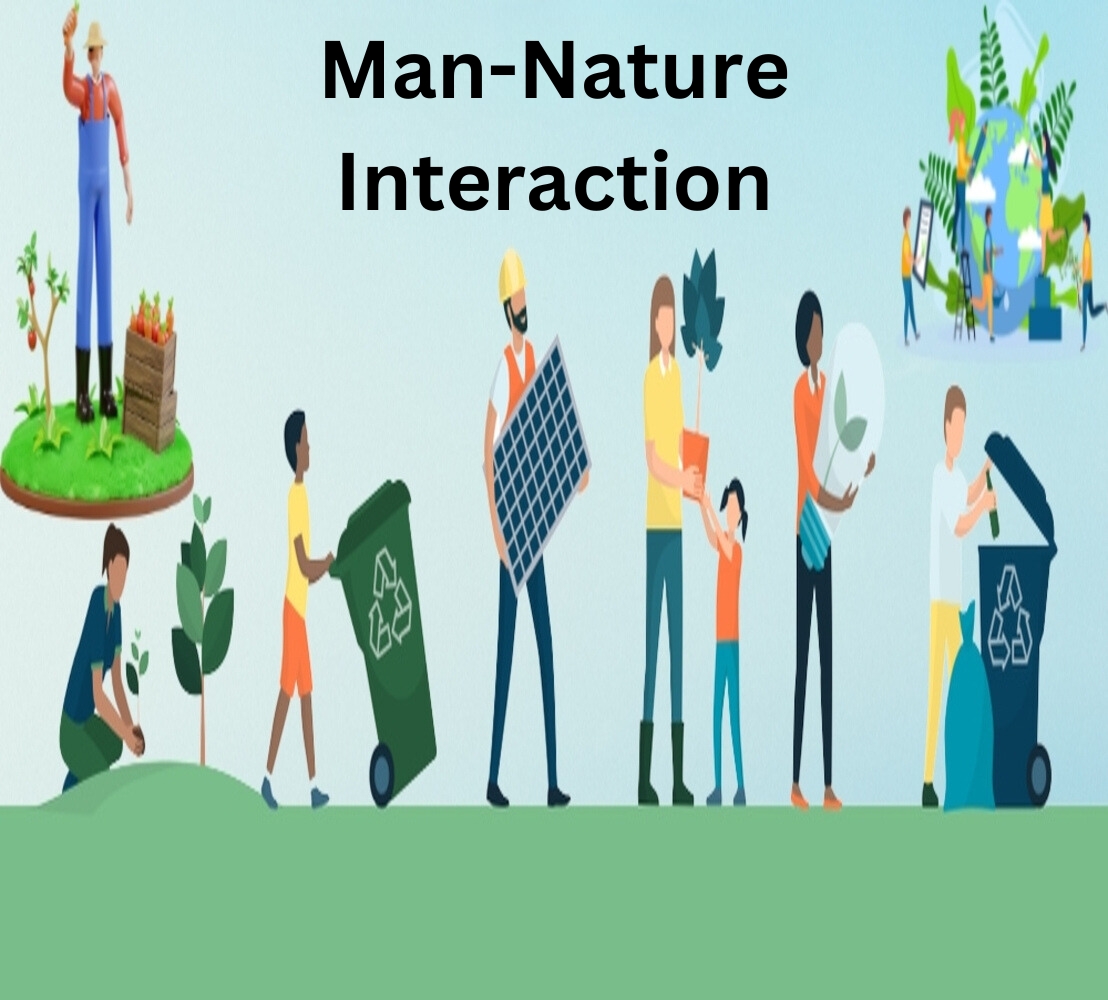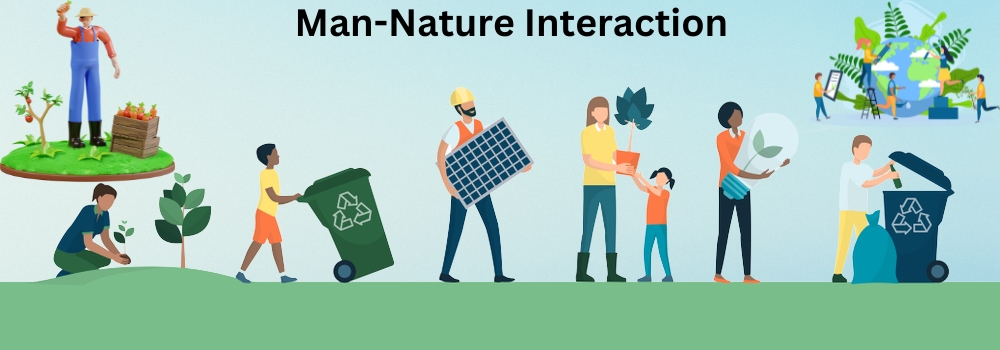Introduction
The complex connection between humans and the environment has been a consistent theme in human history.From ancient times to modern technology the interaction between humans and nature has influenced cultures,societies and the core of our being.In this blog,we analyze the various aspects of this relationship,examining its changes,effects and the importance of living sustainably together.
Evolution of Man-Nature Interaction
Man is at the centre of the biosphere in dynamic equilibrium with other segments of the environment air, water and land. His daily life is heavily dependent on his natural environment he gets food from soil, fruits and timber from trees, medicines from plants,meat from birds and animals, fish from ponds, rivers and seas, water for daily use from springs, rivers and ground water.
Indian Tradition: India holds a rich tradition of environmental ethics. Ancient Indians worshipped Nature—the sun, water, air, soil, plants, and animals. Ancient philosophers believed that the entire universe, including the earth, plants, animals, and human beings, consisted of five essential elements: kshiti (earth), op (water), teja (fire or energy), marut (air), and byom (open space). These five elements formed the bodies of plants, animals, and humans. After death and decay, these bodies returned to the same elements through natural disintegration.
The fundamentals of conservation ethics were brilliantly formulated in the Isho Upanishad during the Vedic era. “The whole universe together with all its creatures belong to the Lord (Nature). Let no one species encroach over the rights and privileges of other species.Man can enjoy the bounties of Nature by giving up greed.” In other words, if we over-exploit Nature, we shall lose all the benefits from Nature.
In the Maurya period the emperors emphasized the awareness campaign for conservation of Nature and upholding the spirit of non-violence towards trees and animals. Compassion for animate and inanimate objects is part and parcel of Indian culture. But unfortunately,we have forgotten this basic philosophy and turned to Western culture of conflict with Nature.
Scan of Human Civilization: It is worthwhile to scan human civilization since humankind’s arrival on Earth. Early humans lived in mountain caves and looked at the forces of Nature with wonder and awe. They were panicky about the sun, lightning, thunder, rains, and wild animals in the forests. They were constantly occupied with protecting themselves and their families against the hostile elements around them. Gradually, they discovered fire and made stone tools for defense against wild animals. About 10,000 years ago, agriculture was discovered, marking the starting point of human civilization.
In course of time man devised science and technology step by step and depended on these for improving his living standard. This became prominent after the Industrial Revolution (1760-1840) which transformed England from an agricultural country into a predominantly industrial one. The invention of steam engine by James Watt (1785),mechanization in textile industry, advancement in mining, transport and ship-building industries made Britain the most prosperous country in the world. This was promoted by British colonial exploitation.
With the help of science and technology, humans have successfully overcome natural barriers and firmly established their supremacy over Nature. Consequently, they can now travel from one part of the world to another within hours, embark on journeys to outer space and distant planets, dive to the ocean’s depths, and explore the wonders hidden there. However, alongside these achievements, human actions have increasingly degraded and polluted the environment. Specifically, deforestation, urbanization, and industrialization have significantly reduced environmental quality. As a result, these impacts now pose a serious threat to the very survival of humanity on Earth.
Efforts towards conservation and sustainable practices
Recognizing the need for change, people are adopting sustainable practices and conservation efforts to reduce environmental harm. Protected areas and conservation initiatives aim to preserve biodiversity and natural wonders.
Challenges and Opportunities in the 21st Century
In the 21st century, human-nature interactions are more complex due to urbanization, population growth, and technology. While these increase environmental pressure, they also offer opportunities for sustainable solutions, eco-friendly practices, and global collaboration to address challenges.
Conclusion
The story of human-nature relations includes both progress and challenges. As Earth’s stewards, we must recognize our impact and strive for harmony with nature. By embracing eco-friendly habits, supporting conservation, and respecting the environment, we help protect its delicate balance for future generations.

